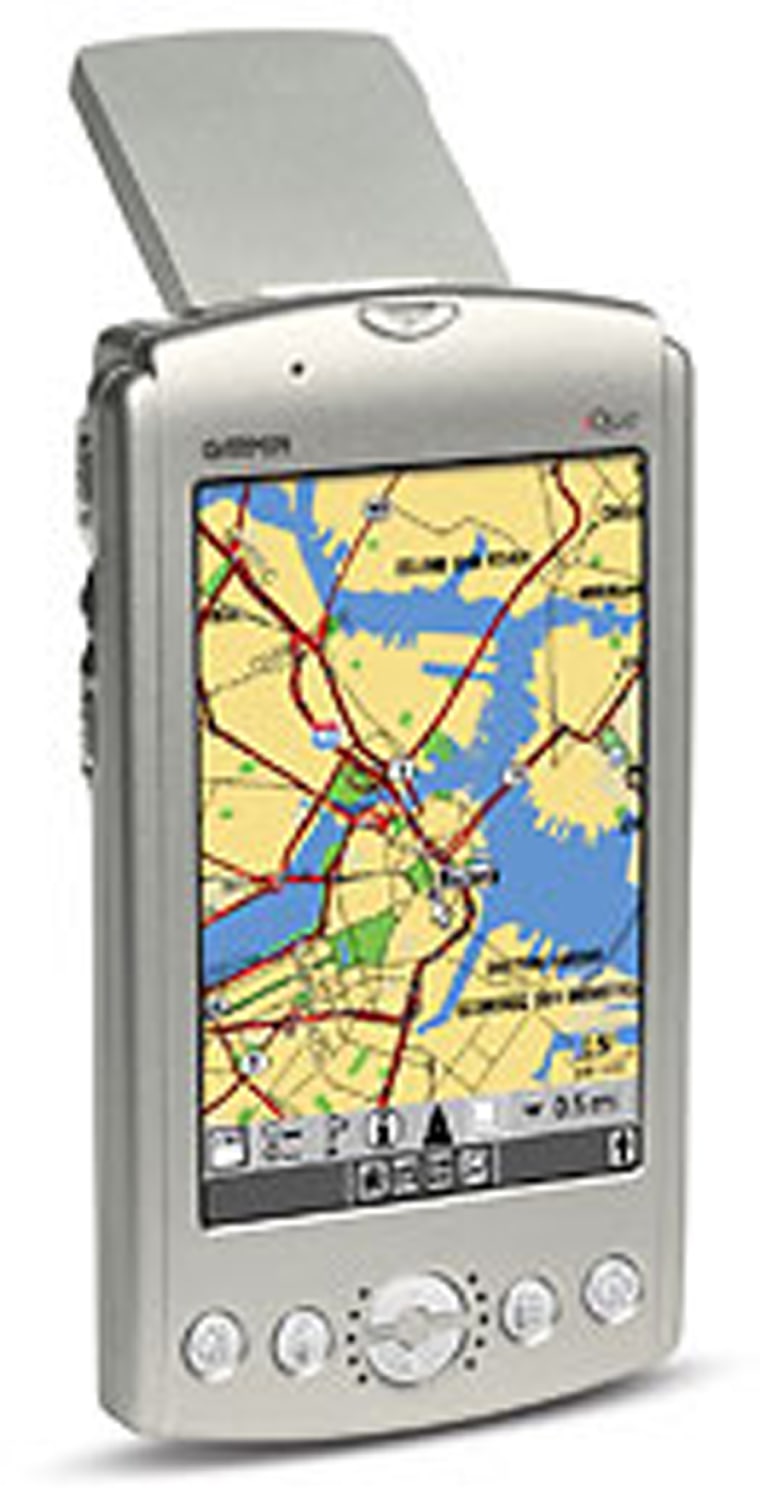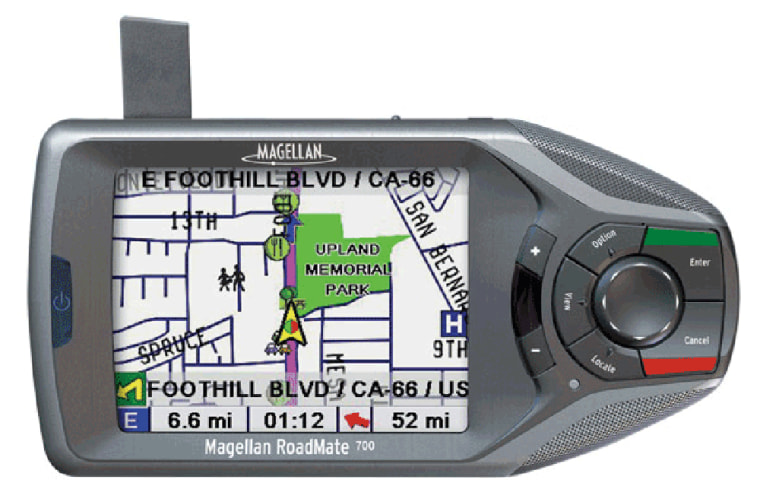They're late for a party. It's raining. He wants to hunt and peck through neighborhood streets, feeling his way to the restaurant. She wants to stop and ask for directions. Whoever wins, the other one is bound to sulk.
Unless, of course, this couple has in their car a magical relationship saver known as a GPS car navigation device. He may get offended at being forced to ask a person for help, but no self-respecting, I'll-never-ask-for-directions man would resist the chance to ask a gadget the same question.
Yes, forget self-help books, John Gottman's Love Lab or mediation training. If you want to add peace and harmony to the world or just help friends who are a little lost, GPS navigation is the gift to give.
Get me to the church on time
With GPS in your car, you don't ask for directions, just an address. The navigation device does the rest, telling you when to turn and even recalculating if you make the wrong turn anyway. In fact, there really are no wrong turns, just new routes.
Now, this is technology we're talking about, and there's no such thing as a flawless device. But GPS is pretty mature, and the kinks having been worked out by years of military and maritime applications. It's ready for prime time.
For example: I took a Garmin iQue from Seattle to New York on a cross-country drive this summer. During 3,200 miles of driving, there was only one stretch of road where the device got lost, due to incorrect map information: 3,199 out of 3,200 is a success rate I'll accept any time. It's certainly a lot better than the success rate of my sense of direction.
But GPS car navigation offers much more than turn instructions. One Sunday morning, for example, I was in Terre Haute, Ind., heading east on I-70 with New Jersey as my ultimate destination. That's a long day, so I didn't have much time to spare, but I needed to get to church before noon. So I asked the device for every Catholic church within a few miles of the highway, along my current route. It spat out the name of a church in Indianapolis a mile off the freeway, and gave me my estimated time of arrival, given my current speed. It also gave me the church's phone number. One call to confirm mass times and I made it to the church two minutes before the service -- and hardly skipped a beat on my journey.
The devices can do the same for travelers seeking airports, restaurants and even ATM machines.
Confusing array of options
That's all good news. The bad news about GPS devices: there are dozens to choose from, with prices that range from $100 to $2,000 for an automotive-factory installed device. Outside of digital cameras, there probably isn't a more confusing gadget purchase to make.
Joe Mehaffey operates the definitive GPS research site, http://gpsinformation.net/. A little tired of answering the question with a question ("Which one should I buy?" "Well, what do you want to do with it?"), he refuses to endorse individual models, but did have some good guidelines for new buyers:
"I always try to get people to think clearly about what their application is. There are lot of options out there," he says.

In the general consumer market, GPS devices are either designed for recreational hiking and hunting or to be used in a car. While some devices brag they can be used for both, there's always a compromise. A device with a big-enough screen for car navigation might not be waterproof, for example, a critical option for hikers who inevitably get caught in the rain.
Most people, however, wind up using the GPS in their cars. While there are a myriad of models from Garmin, Magellan and a few smaller manufacturers, essentially, there are two price points for GPS car navigation systems: $600-$700, or $1,000-$1,200.
Here's the difference: The cheaper device will only store enough maps for about a day's worth of driving; driving cross-country would require nightly downloads of new maps, usually from a laptop computer. The more expensive models have memory capacity of 2 gigabytes or more and come pre-loaded with maps of the entire United States and Canada.
Since drivers never have to fiddle with uploading and downloading on a more expensive device, Mehaffey recommends them "for the computer-challenged people." Examples in this price range would be Magellan's RoadMate 700 or Garmin's StreetPilot 2620.
If your gift recipient isn't afraid of a little gadget work, then the slightly cheaper models will work. One good option: the aforementioned iQue, which is a hybrid Palm Pilot and GPS device. It lists at $650, but sells at Amazon for around $500. Garmin's Quest sells for around the same price.
That's about the least you should expect to pay for a capable GPS device. Don't be tempted by low-end GPS devices, which can start at as little as $100, Mehaffey warns. Many don't have enough memory, a large-enough screen or the right software to handle car navigation.
Mehaffey says that most first-time GPS buyers make one of two mistakes: buying a device that doesn't have enough memory to hold map data, or a device with a screen that's too small to see while driving. Minimum acceptable memory is 100 megabytes; minimum screen size depends on the user's eyesight. Mehaffey says he thinks the Quest screen -- 2.2 inches by 1.5 inches -- is about the smallest acceptable size.
Upgrades and accessories
Other things to look out for: Most devices now come with some kind of car mount, a power adapter that plugs into the cigarette lighter and a speaker loud enough to be heard over road noise -- but not all. Without any of those, a GPS for driving directions is not very useful.
Buyers should also check the cost of the device's map upgrades. The device is only as good as the accuracy of the maps loaded onto it, and of course, maps change. Neighborhood are built, road construction is completed. You will likely have to buy a new set of maps at least once before the device becomes obsolete.
GPS enthusiast Jeff Francis advises reading reviews for individual products as well. Some devices have awkward interface designs or quirky software limitations, he says.
"Certain models have incredibly annoying "features," such as refusing to find an address if you don't know the name of the town it's in," Francis says. "This is more annoying than it first sounds."
If the driver isn't sure which town an address near a border is in, finding the location might require several separate searches, for example.
GPS manufacturers are predicting this will be their biggest year ever. Garmin says it already has a backlog of 28,000 orders for its devices -- this after recently announcing quarterly sales had jumped 40 percent in the past year. Christian Bubenheim, senior director of marketing at Magellan, said sales to general consumers have doubled in the past year.
Both promised there would be plenty of devices in stores this winter, and that they would do their part to make the holiday season more peaceful. Or at least, make getting to the holiday party a little more peaceful.
